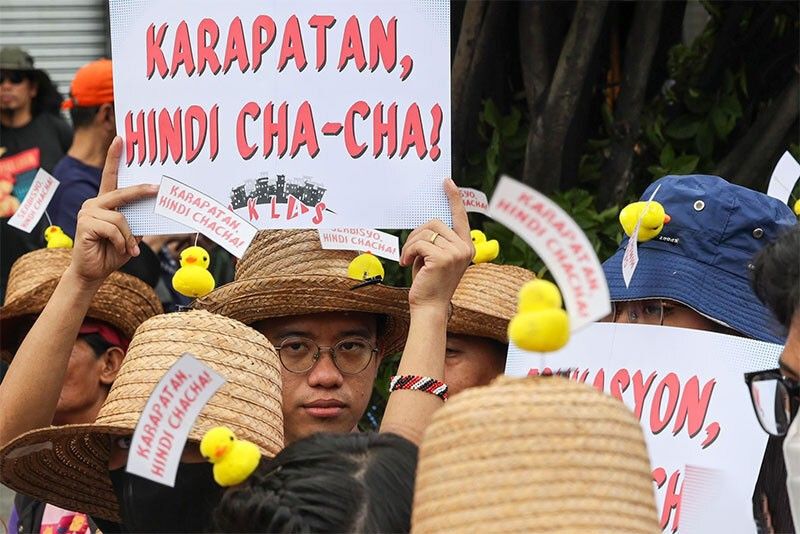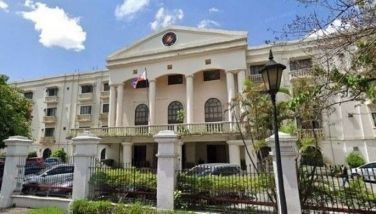House sticking to Holy Week Cha-cha deadline

MANILA, Philippines — Does President Marcos really want a Charter change plebiscite held simultaneously with the 2025 midterm elections? House members prefer to hear it directly from the horse’s mouth.
Administration lawmakers appear determined to finalize economic Charter change before the March 22 congressional Holy Week break, with a plebiscite by July this year.
Reps. Margarita Nograles, Rodge Gutierrez and Zia Alonto Adiong said they would prefer that President Marcos make his own categorical statement on the timeline for Cha-cha, rather than let Senate President Miguel Zubiri speak for the Chief Executive.
“Only the President can speak with certainty on whatever he really wants on the timeline,” Nograles said. “We would just like to say that whatever was taken up behind closed doors should be respected in terms of confidentiality.”
“As far as the House is concerned, our work continues, and we will exhaustively look into the economic revisions in the Constitution and hear the different resource persons while looking into Resolution of Both Houses 7,” Nograles, of Pwersa ng Bayaning Atleta party-list, said.
On Monday, Zubiri said he and 12 other senators were told by President Marcos that he prefers a plebiscite on Cha-cha done simultaneously with the May 2025 midterm elections.
The House of Representatives, led by Speaker Martin Romualdez, has voiced its commitment to adopt the Senate’s Resolution of Both Houses 6 (RBH 6) in toto.
But Nograles said there is a need for a smart approach to decision-making, citing the importance of setting “specific, measurable, achievable, realistic and time-bound” goals while awaiting further directives from the President.
“It’s good that we do have this timeframe, although we have yet to hear what the President really has to say about this,” she said.
For his part, Gutierrez – a member of the House minority bloc – told media he preferred hearing directly from the President.
He urged senators to consider avoiding an extension of the deliberations on RBH 6 before sine die adjournment.
“But of course, again, we would urge our colleagues in the Senate, at least as priority, hopefully we don’t extend it all the way to sine die,” Gutierrez said.
“I think it’s possible that we have a fruitful exhaustive discussion which still follows the original timeline that they gave, that this can be finished before Holy Week,” Gutierrez said.
Adiong, meanwhile, emphasized the urgency of addressing economic constitutional amendments, saying it is a legislative priority of the Marcos administration.
“It’s very clear that the President wants to push for the changing, amending the provisions in the Constitution, particularly the economic provision. So what we’re doing here in the House is to translate that priority and policy of this current administration,” he pointed out.
Adiong also stressed the importance of expediting the process before the Holy Week break. “I personally would want this discussion on the economic provision done before the break for the Holy Week. Actually, that’s the original plan.”
Meanwhile, an umbrella organization of foreign businesses in the Philippines has expressed approval of easing economic restrictions in the 1987 Constitution to smoothen the entry of foreign direct investments (FDIs).
“Our group supports the easing of restrictions of FDIs wherever this is possible,” the Joint Foreign Chambers of the Philippines (JFC) said in a letter to Speaker Martin Romualdez.
“We are of the opinion that the removal of economic restrictions would facilitate increased FDI in sectors where such investment is restricted,” it added.
While it recognized the government’s mandate to protect vital national interests by placing some restrictions on FDI, JFC noted that most national economies use legislation or executive regulations to make business environment freer for investors.
“The advantage of using legislation or executive regulation is that it allows both the Legislature and/or the Executive to quickly adjust the regulatory environment for FDI in order to adapt to changes in technology, comply with requirements of international treaties or take advantage of new opportunities to benefit in the global economy,” the JFC said.
“In recent years, the Philippine Congress has indeed done just that through its amendments to the Public Service Act, Foreign Investment Act and the Retail Trade Liberalization Act,” it pointed out.
Meanwhile, the group explained that while the proposal to insert the phrase “unless otherwise provided by law” in amending restrictive provisions in the Constitution is welcome, it isn’t likely to send a strong signal to foreign investors as direct revision of the restrictive provisions.
“While it may not send as strong of a signal to foreign investors, the insertion of the phrase ‘..unless otherwise provided by law’ makes possible – if the Congress so decides – to further ease restrictions that would facilitate increased FDI,” the group said.
Moreover, the JFC emphasized that the Philippine economy is now more integrated with the global economy than it was over three decades ago, citing its membership in the World Trade Organization (WTO), the ASEAN Economic Community and the Regional Comprehensive Economic Partnership (RCEP).
In addition, it also has free trade agreements (FTAs) with Japan, South Korea and the European Free Trade Association (EFTA).
On top of this, the foreign chambers highlighted that the country would need to negotiate further FTAs, such as with the Comprehensive and Progressive Agreement for Trans-Pacific Partnership, for the country to remain competitive.
“Many of these developments emphasize the need for free movement of capital across borders and a level playing field between foreign and domestic investors without undue restrictions,” the JFC said.
The JFC is composed of US, Australian-New Zealand, Canadian, European, Japanese and South Korean chambers of commerce as well as the Philippine Association of Multinational Companies Regional Headquarters.
On Monday, retired chief justice Reynato Puno warned lawmakers that inserting the phrase “unless otherwise provided by law” in the Constitution may do more harm than good.
“The use of the phrase ‘unless otherwise provided by law’ is vulnerable to another constitutional challenge. Allowing Congress to use its lawmaking powers to amend the Constitution may be questionable,” Puno said.
Puno, who was one of the framers of the Constitution, suggested it might be better if lawmakers simply “repeal” what they deem prohibitive or restrictive in the economic provisions of the Charter.
“The laws that will be passed by Congress for this purpose will not be approved by the people in a proper referendum,” he said.
According to Puno, a plebiscite on the matter, or the “approval by the people cannot be set aside, cannot be short-circuited.”
“So again, these are some of the constitutional problems. What is the way out? My respectful submission is to just do away with this phrase unless otherwise provided by law,” he said.
“Just repeal the three restrictive provisions, which we want to be out,” Puno said, referring to Articles 12 (public utilities), 14 (basic education) and 16 (advertising).
“In addition, you just repeal Article 2 Section 19 of the Constitution which states ‘the State shall develop a self-reliant and independent national economy effectively controlled by Filipinos.’ Include that in the repeal,” he proposed. – Catherine Talavera
- Latest
- Trending




























